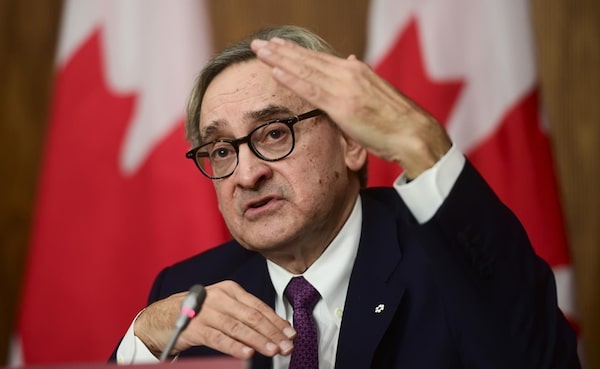
Chair of the Board of the Canada Infrastructure Bank Michael Sabia takes part in a press conference in Ottawa on Oct. 1, 2020.The Canadian Press
Michael Sabia, who has instantly become the most powerful public servant in Ottawa, will advise Finance Minister Chrystia Freeland on the rollout of the green infrastructure plan for the 2021 budget.
That plan will involve far more than spending on windmills and public transit. Mr. Sabia, who is joining the Department of Finance as deputy minister (to the surprise of many), envisions a future based on major government investments in areas such as data infrastructure: the combination of hardware, software and people that permits an organization or a government to mine data so as to understand what is happening in society and the economy in real time.
Prime Minister Justin Trudeau would like a generation-defining infrastructure plan to be his lasting legacy. The COVID-19 pandemic offers him the opportunity to act on that wish. Now that a vaccine is starting to roll out, the government considers planning for the peace to be every bit as important as winning the war against the virus.
The opposition parties are unlikely to agree. You may well be casting a vote next spring in a federal election fought over whether Canada should follow Mr. Sabia’s advice.
In the early 1990s, Mr. Sabia was seen as a brilliant young public servant, on his way to becoming the youngest-ever Clerk of the Privy Council, before his former boss, Paul Tellier, convinced him to leave government and join him in privatizing the Canadian National Railway.
Mr. Sabia went from CN to Bell Canada Enterprises, where he became CEO. For a decade, starting in 2009, he was head of the Caisse de dépôt et placement du Québec, Quebec’s pension fund. He is one of this country’s best known CEOs.
But in the last year he has been jumping about: leaving the Caisse to become director of the Munk School of Global Affairs and Public Policy in Toronto, and then chairman of the board of the Canada Infrastructure Bank.
He has also advised the Trudeau government formally and informally. The message has always been the same: Governments need to responsibly invest in the technology and infrastructure required to advance the knowledge economy within a sustainable environment.
In March, as the world grappled with the onrushing COVID-19 pandemic, The Globe and Mail published a column from Mr. Sabia in which he outlined three crucial tasks for governments. First, protect citizens from the virus. Second, protect workers and businesses from the economic consequences of the virus. Third, “begin thinking now about a new generation of infrastructure and spending on education. About clean tech and retooling our health-care system. And about refinancing for the long term a small and medium enterprise sector that will emerge from this crisis battered but still the engine of jobs in our economy.”
By parachuting into the government as deputy minister of finance, Mr. Sabia will be right down the hall from Ms. Freeland, as they fashion a budget to fulfill that mandate.
Of course, policy planning is one thing; political reality is something else. Will Erin O’Toole’s Conservatives demand greater fiscal discipline, rather than expensive new investments? Will Jagmeet Singh’s NDP require an emphasis on help for the most vulnerable? Mr. Sabia’s vision for Canada’s future may be tested in an election.
If so, it could be a hard sell. The vast majority of Canadians have no idea what data infrastructure means. (I had to look it up myself.) What matters for them is ensuring that the health and long-term-care sectors are able to meet the needs of an aging population, that government finances are sound and that growth and jobs return.
How do you sell data infrastructure on the doorstep in middle-class, suburban Canada?
Also, voters think Google knows too much about them already. Do they want the federal government knowing more about them, too? Any innovations by government in mining data will need to take into account privacy concerns.
But the fact remains: Mr. Sabia has returned to the public service after almost three decades for a reason, and that reason is to craft a plan to take this country where he thinks it needs to go.
This government is not planning half measures for the year ahead.
Know what is happening in the halls of power with the day’s top political headlines and commentary as selected by Globe editors (subscribers only). Sign up today.